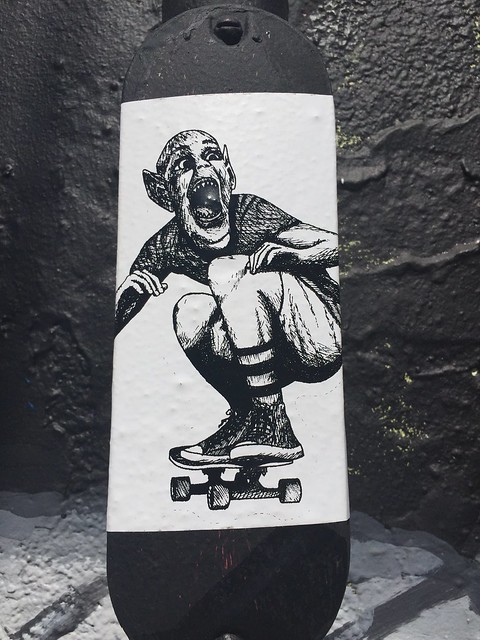
The Weekly World News no longer graces the checkout at your local supermarket, but that hasn’t stopped Bat Boy from taking up skating. Bat Boy rides again!
Spotted just outside The Sycamore

The Weekly World News no longer graces the checkout at your local supermarket, but that hasn’t stopped Bat Boy from taking up skating. Bat Boy rides again!
Spotted just outside The Sycamore
Young’s BBQ, the (ostensibly) Korean hole in the wall restaurant behind El Toro that you never went to finally closed a few months ago. Recently the space has undergone a soft story retrofit.
Now a new liquor license application has appeared on the window with the name “Jerartdon LLC.” What could it mean?
Two of the names on the license in the state’s liquor license database shed some light on the situation. Jerome Rivoire is the owner of Valencia St.’s Garcon, and Arthur Wall is their executive chef.
What can we expect? So far the Garcon folks have been quiet about the whole endeavor, but it’s safe to assume pot stickers served by a woman who calls herself “Honey” are out.
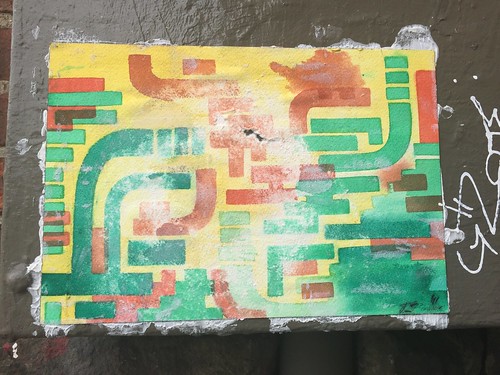
Recently I’ve come across a series of unusual paintings of brightly colored geometric patterns pasted to the wall in various parts of the city. The first one was stuck to a building near Slim’s. The other two were pasted to the side of the Victoria Theater.
What are these paintings supposed to mean? Who’s behind them? We may never know for certain, but personally I’m hoping they’re a new type of QR code left here by aliens. So please let me know if you see an app for scanning alien QR codes on your phone’s app store. Thanks in advance.
Today I finally got around to visiting KitTea, San Francisco’s first (and only) cat cafe. The goals of KitTea are to provide adorable cat-based entertainment, but also to find permanent homes for the cats — all of which are rescue cats up for adoption.
The basics are pretty simple: you can either walk in or make a reservation, and for your 30 or 60 minute session you can play with cats while drinking unlimited tea. The tea is quite good, but you could be forgiven for not noticing when there’s kittens everywhere and all manners of cat toys.
I should mention that most of the cats are kittens. I only spotted one adult cat, but if you know anything about cats you know that they spend most of their time sleeping. The “cat wranglers” at KitTea are very adamant about letting sleeping cats sleep, though you are allowed to pet them if you’re gentle enough not to wake them.
As for getting fur in your tea or food you don’t need to worry. The kitchen is in the waiting room outside of the cat play area.
Overall the cats seemed very well taken care of. If I was going to adopt a cat, the relaxed environment of a cat cafe seems to me like a better way to see if a cat is right for you than the jail-like environment of your average pound.
So if you’re looking to adopt a cat — or if you just want to hang out with some feline companions for a while — consider giving KitTea a shot. What do you have to lose? Aside from your dignity when you come home covered in cat hair, of course.
Yes, I had to resort to taking these screenshots with my phone.
Recently I started poking around an old hard drive I found and uncovered a treasure trove of old selfies, homework, and even a diary listing the first time I ever kissed a girl (January 13th 2000.) Among other historic artifacts was a game I made for a computer science class during my junior year of high school called Poorly Drawn Robots In Space.
Of course, this had nothing to do with whatever so-called “assignment” I was supposed to be doing for the class. I liked making games more than learning about for loops or whatever, and besides — you try telling a 17 year old what to do. Go ahead. See how that works out for you.
The game is your typical Lode Runner knockoff: you walk around avoiding the bad guys and collecting keys to get to the exit. There’s a total of three levels.
When I found the game I was shocked: it still actually runs! So I put the whole thing up on GitHub, ugly source code and all.
Keep in mind the game is for Windows only, and some of the colors are screwed up because it was designed back when 256 colors was the norm. Oh, and there’s no sound. Extract the .zip and run robots.exe.
Controls: Left/Right to walk, Ctrl to jump
License: ¯\_(?)_/¯
Some unusual transit-themed street art has appeared around the city recently. Perhaps you’ve seen it? For example, I spotted this odd BART ticket (actually a sticker) a while back:
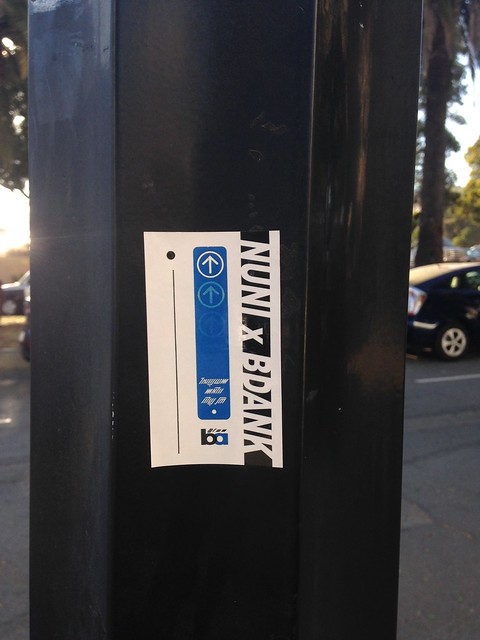
Today I stumbled across this unofficial ad at a Muni stop:
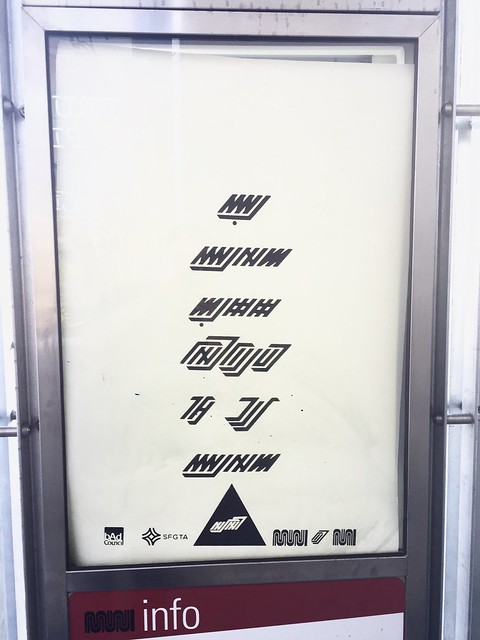
A little googling revealed that these are the works of “Nuni,” who apparently goes by @therealnuni on Instagram.
The street art clearly contains some kind of hidden messages, seemingly written in an alien language. Obviously I had to crack the code.
My “aha!” moment was when I remembered playing Commander Keen as a kid, deciphering the Standard Galactic Alphabet on a piece of paper as I went. The Nuni “cipher” works the same way: it’s English words written in a different alphabet.
Cracking it is only a matter of finding a few common words and applying your hangman and/or Wheel of Fortune expertise to work backwards to discover the whole alphabet. The first thing to decode is the word “Nuni” itself:
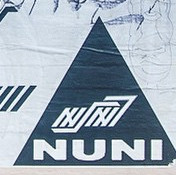
Many of the messages are exactly what you’d expect them to be. For example, what does it say on a BART ticket in the blue box at the top? Yup, that’s what the encoded message says too.
I’ve managed to crack 21 out of 26 letters in the alphabet so far. I don’t want to spoil it for anyone, but if you get stuck feel free to shoot me an email — my address is in the sidebar.
Sincerely yours,

Since I had jack shit else to do needed to get some fresh air this afternoon I took the F-Market over to the Wharf to wander around and check out everyone’s favorite tourist bullshit. I was lucky enough to get the back of a streetcar all to myself for most of the ride, so I filmed a few shaky iPhone videos from the back window.
First, here’s looking back at Market Street starting near the Dolby building:
Again on Market Street, this time near UN Plaza:
Finally, the F-Market goes from Embarcadero to Jefferson St.:
And now since you’ve made it this far, I’m going to scare you away with a vertical video (gasp!) of the most terrifying thing at the Wharf: Lauffing Sal.
At some point in the last couple of weeks Valencia St.’s Luna Park shut its doors and stopped answering their phone. But that’s not all: two official notices (see above) appeared taped to the building. One is an order of abatement regarding building codes, the other is a notice that the building is in danger of foreclosure. According to the later document the owner of the building is behind on mortgage payments by over $100,000. Yikes!
As you may recall, Luna Park’s owners made some grumblings about labor costs before trying to sell the restaurant to Gavin Newsom’s company. That fell through, so they tried again with the owners of Mission Beach Cafe. (Luna Park’s sister location in LA was sold to new owners years ago.)
Now it’s not exactly clear what will happen. The liquor license transfer is still pending, but who knows what’s in store if the building winds up getting auctioned off by the bank. Either way the sun has officially set on Luna Park*.
(* Sorry.)
Update: Inside Scoop confirms that Luna Park is closed for good. Still, this doesn’t explain why the building is in danger of foreclosure.
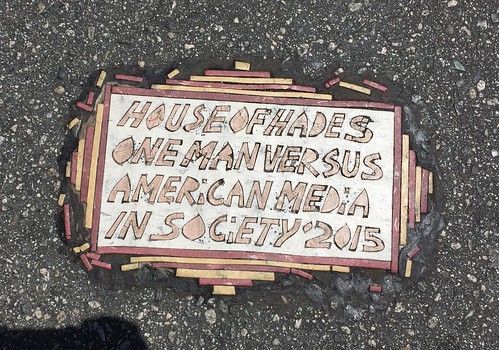
If you’ve crossed the street at Van Ness and Market recently you may have noticed a strange little plaque embedded in the road near the crosswalk. It reads:
HOUSE OF HADES
ONE MAN VERSUS
AMERICAN MEDIA
IN SOCIETY 2015
…huh?
Turns out it’s not alone; many strangely worded linoleum plaques have appeared in roadways all over the US and South America since the 80’s. They’re known as Toynbee tiles, a reference to the wording of some of the earliest ones. You can find more via Google Image Search.
Who’s installing them? One filmmaker produced a documentary film on the subject — but never resolved the mystery entirely. The general consensus seems to be that these plaques originated in or near Philadelphia. The tiles later spread and changed in their messages. One theory is there are now multiple copycats, an idea supported by an Instructables video demonstrating how to make your own.
Still, knowing what these plaques are called and where they came from doesn’t tell us about who placed this particular one at Van Ness and Market or what its message is intended to convey. For now at least, that remains a mystery.
Earlier today was Muni’s annual(-ish) Cable Car Bell Ringing Contest. What is a Cable Car Bell Ringing Contest, you ask? It’s a two-part contest where “amateurs” (non-Muni employees) compete, and a second part where cable car operators compete.
The rules for each part are very different. The amateur competition allows music, dancers, and apparently bribing the crowd with free Giants merchandise. This part takes place on a standalone bell outside the cable car.
The cable car operator competition takes place inside a cable car that was somehow transported to Union Square. This is the main part of the event, and only bell ringing is allowed. I’ve posted videos of the top two bell ringing champions below.
Coming in at second place, here’s previous champion Trini Whittaker:
Here’s first place winner Byron Cobb:
Finally, here’s a few photos from the event:
Travel, movies, comedy, tech, and whatever I find on the streets of San Francisco.
Follow this blog with RSS or on Bluesky.
Contact: mrericsir “at” gmail.com
16thmission ameritrip2019 art bart cats chicago clarionalley coffee covid-19 dolores park europe film food graffiti greece gregg turkington history humor immersive los angeles mission movies muni munimetro murals museums Music nonchalance northbaytrip2019 on cinema photos public transportation Rant restaurants san diego san francisco soma streetart television the jejune institute tim heidecker trailers travel videos wtf